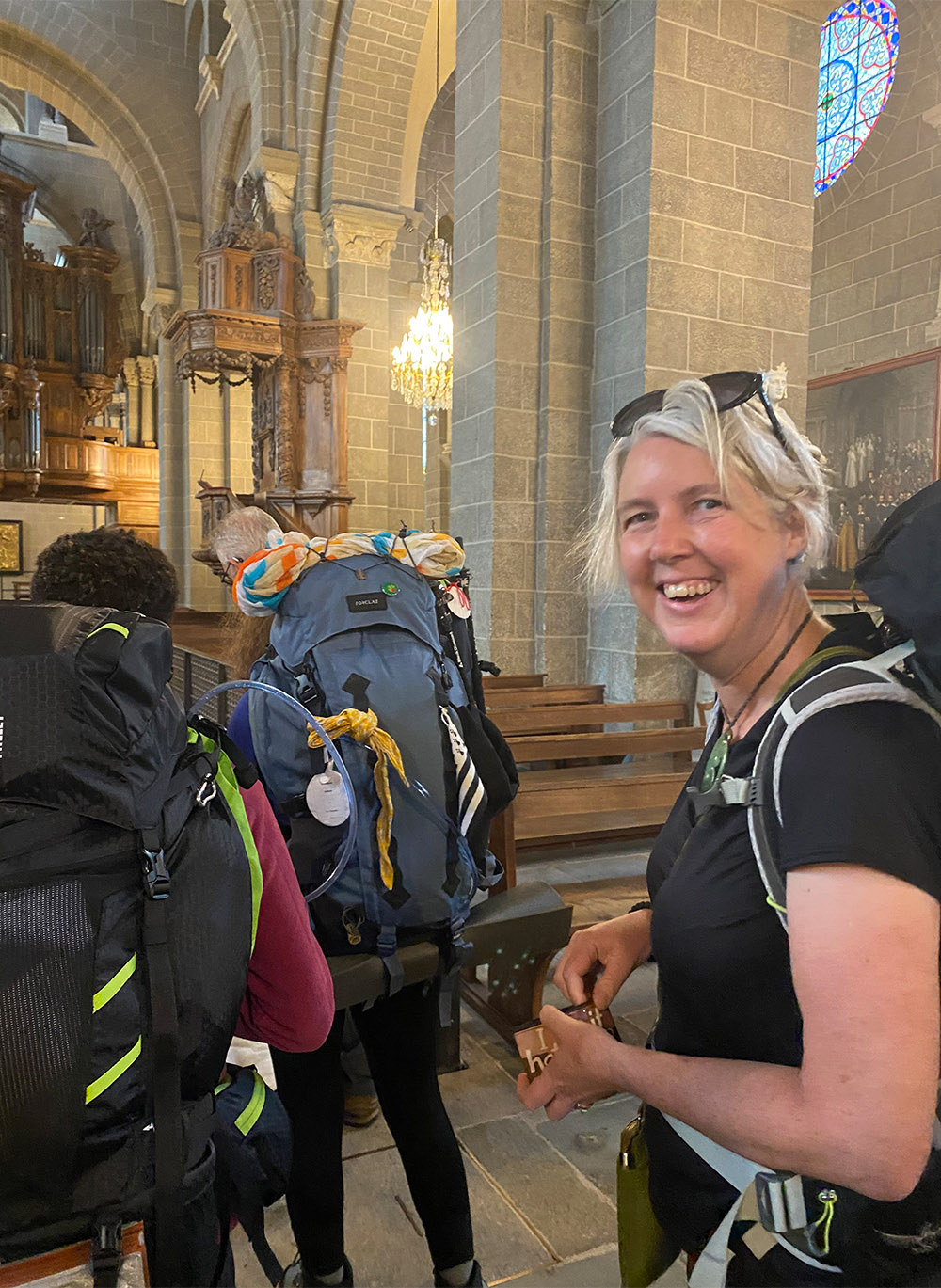

Parkinson’s and a pilgrimage
April 3, 2025
When New Zealand author Jennifer Andrewes was diagnosed with early-onset Parkinson’s in 2020, at the age of 48, she set out on an 1800km pilgrimage across France. In an extract from her book A will and a way: on foot across France, Andrewes writes first she was angry, then she started walking.
”The only place where your dream becomes impossible is in your own thinking
Robert H Schuller
In April 2014, we took a sabbatical to live with our family in Quillan, a small town in the Aude, in the foothills of the French Pyrenees. Our aim was to give our growing boys the experience of school in France, exposure to another language and culture, and a different perspective on life. I wrote about those adventures in my book Parallel Lives: Four Seasons in the French Pyrenees.
In those first weeks living in Quillan, I noticed the red-and-white route markers of the grandes randonnées – the GR walking trails that crisscross France – and watched hikers stopping for refreshments at our local café. Some were walking the length of the Pyrenees. I envied them. How wonderful, I thought, to walk those trails myself.
Growing up in a city, living close to the city centre, I’d always walked everywhere – school, university, work. As a student, I dabbled in back-country tramping in New Zealand, but it was during a year teaching in France in the mid-1990s that I first got into regular long-distance walking. I joined a local walking group in Dunkirk, eager to see more of the countryside and meet people. That time sowed the seeds of my love for walking off the beaten path – for venturing beyond the tourist trail to discover hidden villages and quiet roads.
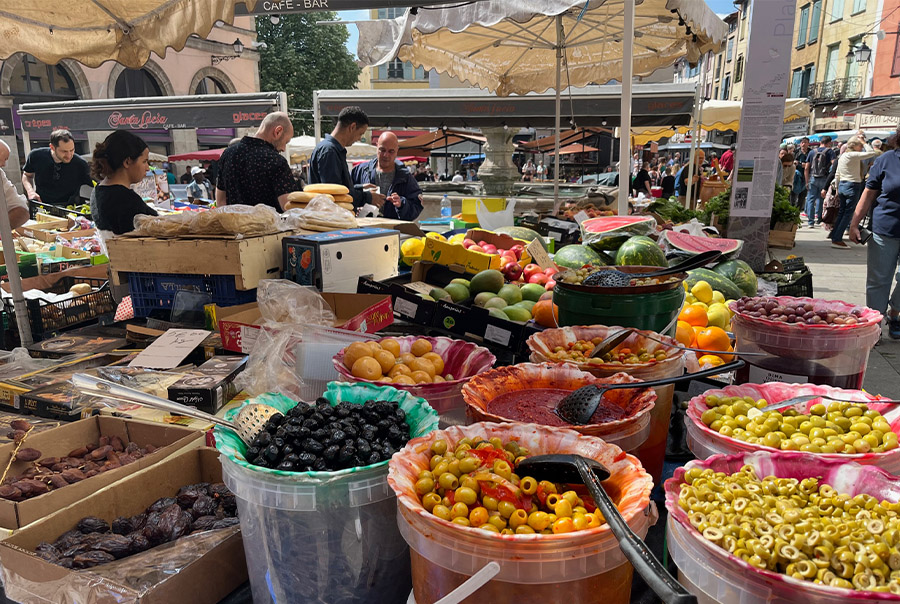
The Saturday market in Le Puy-en-Velay is the perfect place to stock up on lunch supplies for the first day of our pilgrimage.
Later, living in Quillan, I joined the local walking group and heard fellow hikers speak passionately about the Camino de Santiago. They described it as transformative – a mix of freedom, connection, and profound achievement. A vague dream began to form: one day, I would walk the Camino.
But life was busy. With three active boys, a full-time job, and endless commitments, I couldn’t see how it would ever happen. When would I find time to train, let alone two months out to walk. It seemed like a huge challenge: I wasn’t sure I was fit enough. I also questioned my motivation. I lacked religious conviction or an obvious cause to which I could dedicate the journey.
Then, in February 2020, I was diagnosed with early-onset Parkinson’s, a progressive condition linked to declining dopamine levels, affecting movement and motivation. My neurologist told me I might have five good able-bodied years ahead of me. I was upset. I was angry. I was anxious. I was depressed. But I was determined not to let it get me. I was young. I had a family, a career, a life, plans. I wasn’t interested in being told what I could and couldn’t do. Perhaps I was in denial, but I was determined to carry on regardless.
At the same time, my neurologist’s blunt advice was a wake-up call: life is short, mobility isn’t guaranteed, and if there were things I wanted to do, I shouldn’t wait. Exercise, he said, was one of the few proven ways to slow the progression of Parkinson’s. Suddenly, I had my reason to walk.
Bluntly, I was contemplating losing my will and my way. Walking became not just a dream, but a necessity – a tangible action to keep moving forward, literally and figuratively.

Preparing to set out from Le Puy after the pilgrim blessing, I am brimming with joy and nervous anticipation.
Norman Doidge’s The Brain’s Way of Healing inspired me with the story of a man who ‘walked off’ his Parkinson’s symptoms. Raynor Winn’s The Salt Path deepened my resolve with its account of the transformative impact of walking on her husband’s health, despite his progressive neurological condition. Inspired, I wondered if I could do the same. Putting one foot in front of the other every day felt like a simple, positive action to keep moving forward – literally and metaphorically.
In short, where there’s a will, there’s a way.
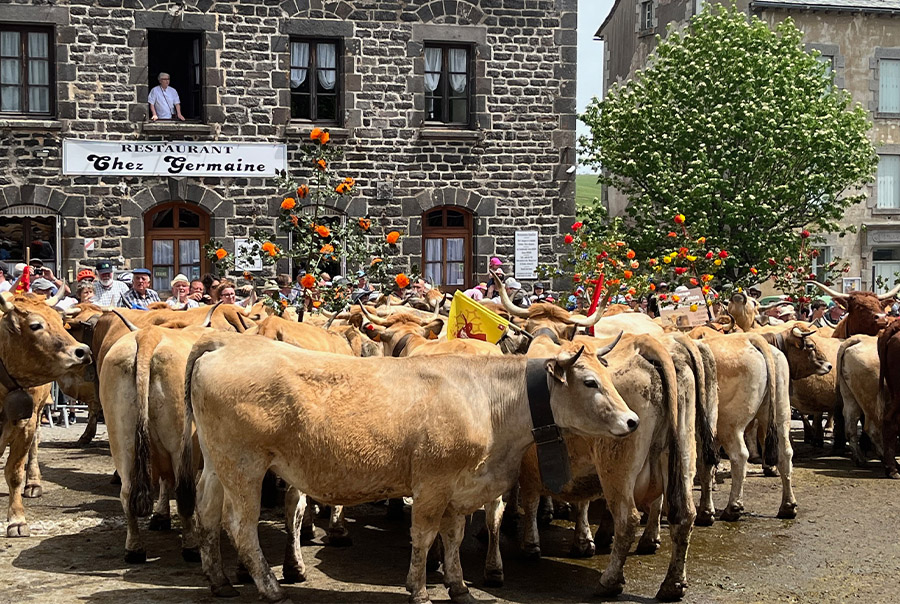
The highlight of our weekend in Aubrac is the transhumance – the annual movement of the cows, wearing decorative headgear, to their summer pastures.
Day 18: Conquering cliffs and plateaus
Have I mentioned it’s hot? Well, it is. It’s at least 32C today, despite not quite being the end of May, and there’s no let-up in the heat on a mostly shadeless trail.
Did you think we were walking in a river valley? You could have fooled me. Most of our time is spent climbing cliffside paths, trudging across the plateau, or briefly skimming the tops of villages, far out of reach of the water. A glimpse of the river is all we can hope for, as if it’s teasing our hot feet and sweaty faces. Our clothes stink from days of walking in the heat, never quite being fully washed or fully dry. It’s remarkable what you can get used to when you must.
We explore the ruins of the local abbey and stock up on pastries at the boulangerie before heading out of town – only to realise I’ve left my walking poles at the gîte. While Melanie walks on, I head back for them and arrive just as a French couple, going in the opposite direction, are debating how to return the room key from their previous night’s accommodation, which they’ve found in their pocket. No problem, I tell them, we’re staying there tonight, so I can return it. The Camino delivers once again.
These sorts of coincidences never fail to delight me. What are the chances I’d return to the gîte at just the right moment to help them out? Coincidence? Maybe. Serendipity? Absolutely.
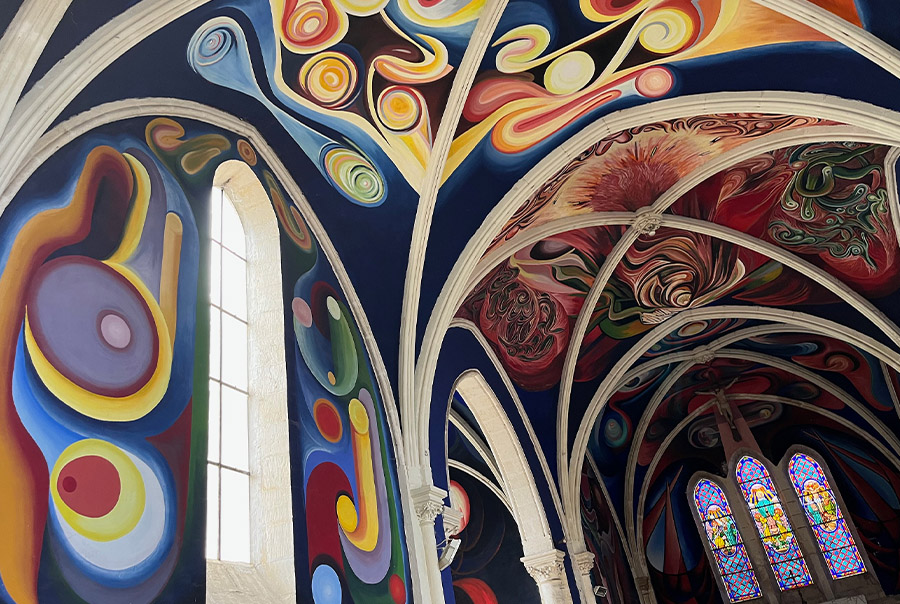
The church at Menoux, with its stunning modern frescoes, is a beautiful place to shelter from a sudden rainstorm.
I finally leave Marcilhac, still in reasonable time and at a steady clip. Melanie is already well ahead, and I am meanwhile aiming to break for lunch in a village 10km on. This, it turns out, is an error in planning: the village is a 400m detour off route in the midday sun, and there are no facilities to be seen anywhere.
I ask a local if there’s a café, bar, pit stop, cold drinks – anything at all. “Ah, non, Madame.” Is that a smirk I glimpse? So, up and onwards I climb to rejoin the path, thirsty, hungry, and desperately needing a loo, with no shade or cover in sight. I’m in the ‘mental’ third of the Camino now. This stretch tests my resilience and determination. It would be easy to give up – to take a bus, to stop walking. Why do I continue?
I meet a man with two black dogs above the cliffs. He asks why I’m doing the pilgrimage. I tell him I have Parkinson’s. Why not walk? He warns me to be careful walking by myself ‘in my condition’, especially with everything going on in the news. ‘You could be beaten up just for your phone.’
Good luck to the sorry sod who tries to take me on all the way out here, in this godforsaken place, ‘in my condition’, on an empty stomach, just for my phone. I rummage in my pack and find an apple and some nuts for lunch. I bust out the emergency condensed milk tube for good measure. Finding a spot in the grass alongside a young French couple from last night’s gîte, I rest for a while. Food in my stomach helps calm my thoughts, and I immediately feel better.
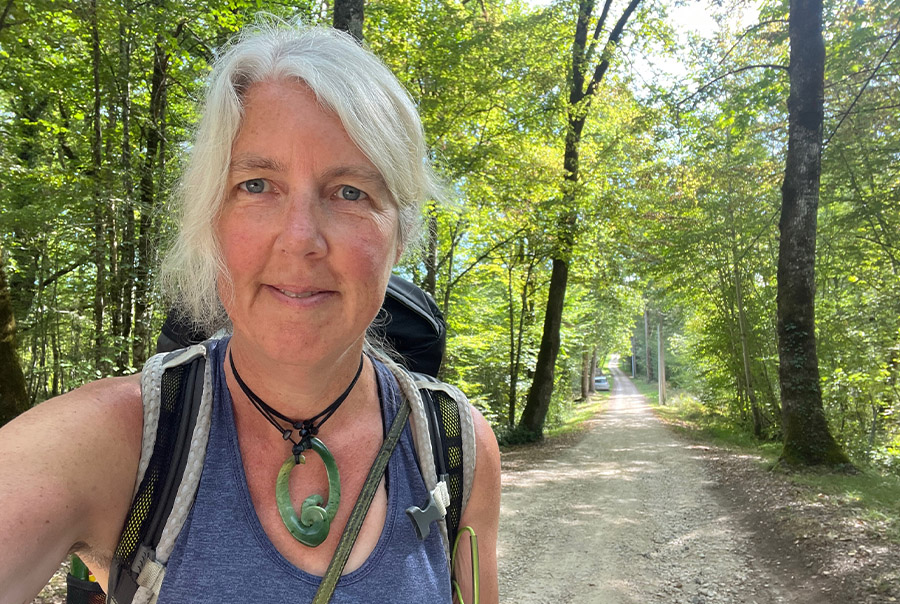
Resilience is required when the first 10 km of the day’s trail consists of a long straight stretch on a stony road.
I’m still desperate for water, but there’s none to be found. I pass an eco-museum, which looks closed, so I trudge on wearily. Later, I discover from Melanie that it was open for drinks and was a rather pleasant shady spot.
Across the endless plateau I trudge, through groves of trees and fields, without a glimpse of the elusive river. And then, rounding a corner, I see Cabrerets spread out on the cliffs above a loop in the river. Wow. Just wow. It’s simply spectacular.
I descend the steep, rocky trail to the soft thwack of canoes on the water and the laughter of children splashing and swimming. It’s not a bad way to end a beautiful spring day.
A will and a way: On foot across France
By Jennifer Andrewes. Pub: April 3, $34.95.
